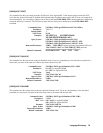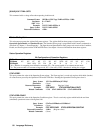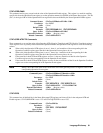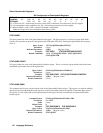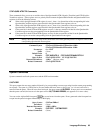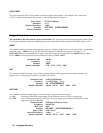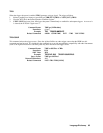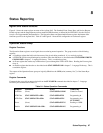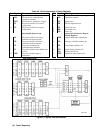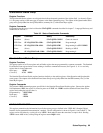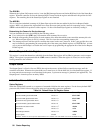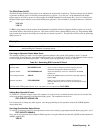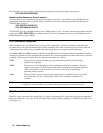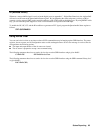
Status Reporting 87
8
Status Reporting
Agilent SAS Status Structure
Figure 8-1 shows the status register structure of the Agilent SAS. The Standard Event, Status Byte, and Service Request
Enable registers and the Output Queue perform standard GPIB functions as defined in the IEEE 488.2 Standard Digital
Interface for Programmable Instrumentation. The Operation Status and Questionable Status registers implement status
functions specific to the Agilent SAS. Table 8-2 and Figure 8-1 show the bit configuration of each status register.
Operation Status Group
Register Functions
The Operation Status registers record signals that occur during normal operation. The group consists of the following
registers:
■ A Condition register that holds real-time status of the circuits being monitored. It is a read-only register.
■ A PTR/NTR (positive transition/negative transition) Filter that functions as described under STAT:OPER:NTR|PTR
COMMANDS in chapter 7 - Language Dictionary. This is a read/write register.
■ An Event register that latches any condition that is passed through the PTR or NTR filters. Reading the Event register
clears it.
■ An Enable register that functions as described under STAT:OPER:ENAB in chapter 7 - Language Dictionary. This is
a read/write register.
The outputs of the Operation Status group are logically-ORed into the OPER(ation) summary bit (7) of the Status Byte
register.
Register Commands
Commands that access this group are derived from the STAT:OPER commands described in chapter 7 - Language
Dictionary and summarized in Table 8-1.
Table 8-1. Status Operation Commands
Register Command Query Cleared By
Condition (None)
STAT:OPER:COND?
Cannot be cleared
PTR Filter
STAT:OPER:PTR <NRf>
STAT:OPER:PTR? Programming 0
NTR Filter
STAT:OPER:NTR <NRf>
STAT:OPER:NTR?
Programming 0 or
STAT:PRES
Event (None)
STAT:OPER:EVEN? Reading or *CLS
Enable
STAT:OPER:ENAB <NRf>
STAT:OPER:ENAB?
Programming 0



